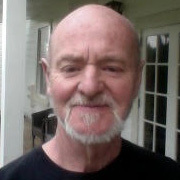
Chris Harrington
Journalist and producer Chris Harrington has more than 30 years’ experience in journalism, much of it as producer of current affairs programmes.
Harrington grew up west of Auckland in the 50s, back when hometown Henderson was still rural. He went on to study at Rutherford College, and began university studies in Geology and English before being seduced by journalism and regular wages. Harrrington did time at The NZ Herald as a court and police reporter, before joining Radio Hauraki once it moved onshore.
His first television job was in 1976 as a reporter on the news for TV1. He went on to spent time in the parliamentary press gallery, and reported for Eyewitness News in the programme's first year. Over the next few decades his stories would cover some of the most significant political and historical events facing New Zealand. Many of these issues he investigated are still in the public eye today.
In 1980 Harrington was one of the founding team of The Video Dispatch, a long-running current affairs show for younger viewers.
His three part Close Up investigation, Death in the Morning, with reporter Genevieve Westcott, followed the intimidation of witnesses by the Head Hunters gang during the trial for the murder of Anthony Evalu. It won a Beattie Award. Behind the scenes, the crew were beaten and intimidated while filming. Harrington calls it "the most important story I ever worked on. Sadly judging by recent events, it seems nothing was achieved and nothing changed".
Harrington moved into producing when he spent five years on Fair Go, from 1987 to 1991. He was proud of the programme’s journalistic integrity and the way it fought for the little guy. During his time on this programme he was awarded the Queen’s Service Medal (QSM) for Journalism.
In the mid 90s he crossed over to TV3 for five years, where he worked on 60 Minutes and 20/20.
Harrington's career highlights include his 1995 Assignment story on the newly adopted MMP two vote system which saw him travel to Germany, to see how and if MMP really worked. The same year this Frontline documentary on Robert Muldoon's refusal to yield power after losing the 1984 election, won a NZ Television Award for Best Documentary. Harrington directed. Also of note is his Assignment investigation ''Scars of War', looking at New Zealand’s role in the Vietnam War, with reporter Rod Vaughan. He produced Assignment’s final programme in 2002, 'Nudge Nudge Wink Wink', with reporter Mark Crysell. It looked at employment conditions in the world’s oldest profession, and the Prostitution Reform Bill to decriminalise prostitution which was before Parliament at that time.
In 2003, again with Crysell, Harrington produced the Sunday programme looking at the case of John Burrett and Matthew Payne, and their alleged plot to kidnap businessman Mr X, Bill Trotter. He won Qantas Media Awards for two Sunday stories: 'Copping It Sweet' (about allegations of police pack rape made by Louise Nicholas), and 'The Lost Children' (about former inmates of Porirua Hospital who suffered alleged abuse there as children). His last story for Sunday, and TVNZ, was 'In The Public Interest', examining whether David Bain should face a retrial after his convictions for the murder of five of his family were quashed by the Privy Council.
Harrington produced many current affairs stories until the closure of the Sunday’s Wellington office in 2007, when he moved into private production and public relations. These days he is a senior press secretary for the Labour Party.
Profile written by Joanne Mitchell
Sources include
Chris Harrington
Television New Zealand Digital Production Library database
John Drinnan, ‘Media: Advice for Holmes – go slow’ – The NZ Herald, 8 June 2015
'Chris Harrington' LinkedIn website. Accessed 27 September 2016